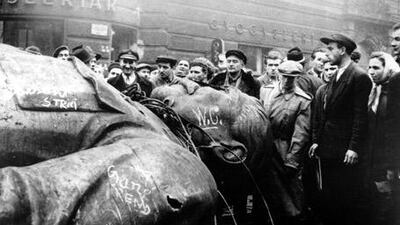A new translation unearths a great work of Europe's postwar 'disaster society', writes Sam Munson The Union Jack Imre Kertész Melville House Dh52 Az Angol Lobogó (The British Flag), a 1991 volume by Hungary's foremost living writer, Imre Kertész, drew its title from a long story detailing a young man's first encounter with what Nietzsche once described as the tyrannical demands of real culture - the call to awareness that certain works of art sound, the duty they impose upon us. Now, an unconscionable two decades after its original appearance, that title story has been rendered into English by the redoubtable Tim Wilkinson and published on its own as The Union Jack.
The fact that the book has been released by the small Brooklyn publishers Melville House should delight and disturb: Kertesz was formerly published by Vintage and Knopf, two of the most important large literary houses. Though he has found an excellent home, the transition casts into relief the difficulties facing translated work, even when its author has won the Nobel Prize. A defining trait of Kertész's art is an elegant pathos (one no contemporary can equal) in addressing the intertwined violence besetting political history and aesthetic form in the 20th century. ("Life," Kertész remarks - "that is to say, the disaster.") The Union Jack, no aberration, wrestles from its outset with its own formal existence: a nameless narrator, whose biography resembles Kertész's, is recounting at the behest of his guests at some festive or commemorative gathering - whose purpose, nature and physical surroundings are deliberately unspecified - an anecdote he refers to as the "story of the Union Jack". This story turns out to a brief, lucid, irresistibly forceful account of the narrator's awakening as an artist-in-embryo while experiencing the operatic thunderstorm of Richard Wagner's Die Walküre. His new-found, insatiable appetite for intellectual grandeur and insight leads him to Thomas Mann's essays on Wagner, then to Hungary's Italian Institute, from whose doorway he witnesses the first of the anti-Soviet demonstrations that erupted in Budapest in the late 1956.
In the midst of the riots, a car rushes down a boulevard full of demonstrators with the British flag draped over its radiator grille. The flag is a symbol of the Allied powers who fought against Hungary's previous occupiers, a reminder that free societies exist beyond the country's borders; the car's anonymous driver waves to the crowd, an indisputable, albeit small, "endorsement" of the demonstration.
The car vanishes at a bend in the road - what happens next is common knowledge. Epiphany in the "disaster society" - a brilliant Kertész term for Communist Hungary and postwar Europe generally - begins at the opera and ends with divisions of armoured tanks. Under such conditions, one survives only by recourse to what Kertész calls "formulations": outdated but familiar experiential forms, donned one after the other as one might exchange winter coats, as an anaesthetic against surrounding horror. Kertész cites the narrator's job as a journalist as a prime example; later he broadens the term to encompass the whole structure of Hungarian society in the years after the war.
It is unclear how just how broad or pejorative Kertész means his term of art to be - or, alternatively, just how ironic or self-deprecating he is being. "Formulation" - expression through words and concepts - is, of course, the primary task of any writer. Does Kertész, then, view writing as self-deception, as a means of merely getting by? Is the narrator's own awakening just another "formulation"? Is the Union Jack? Yes, the Soviet tanks do, in "their haste, their uneasiness, their fear", hesitate at the bend in the road where the flag disappeared, as if encountering some residual spiritual resistance. But they still shell the ground floors of the surrounding apartment blocks into nothingness.
On the other hand, the narrator of The Union Jack, like Kertész himself, survives the shelling, the Soviet reoccupation and years of poverty. And he comes to believe in something superior to formulations: "bearing witness". The italics are the narrator's, and they lend a surprising urgency to the phrase. In further explaining his concept, Kertész reveals that he is not being ironic at all: he identifies a "life lived in muteness", a life free of the "formulable", as the supreme effort of bearing witness, higher even than writing.
This suggests that Kertész, one of the great witnesses of the past century, believes that literature itself, despite his long involvement with it, possesses a questionable, "formulable" character. Recall, for example, that in The Union Jack literary art first appeared as a mere adjunct to music. Indeed, negation, muteness, and the great value of tautology are all sustained, even constitutive, themes in Kertész's work.
The Soviet tanks of The Union Jack are merely one more mask, not the ever-more-monstrous unfolding of history itself. Small wonder the unspoken remains for Kertész a means just as powerful as the written, or the formulated, to confront life - that is to say, the disaster.
Sam Munson is a regular contributor to The Review. His first novel, The November Criminals, will be published in April.

